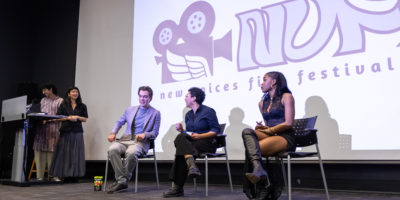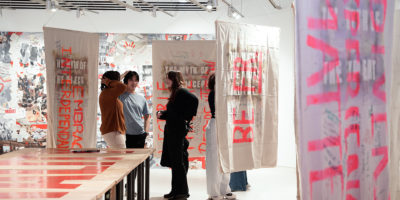By Shawne Fagan
Garbage. When it comes to the arts, there’s a lot of it out there. In the face of the banal, art that strays from the tried and true formula of the mainstream is more essential than ever. This is what makes Buddies in Bad Times Theatres so vital.
In the new year, almost 20 years after it was founded, Buddies continues its battle with the numerous difficulties it has struggled to overcome since its inception.
Since founding Buddies in 1979, Sky Gilbert, founder and former artistic director of Buddies, has been at the centre of the evolution of gay theatre in Toronto. Gilbert and the company ended up developing into a distinctive voice for the gay and lesbian community by the mid-’80s.
The initial mainstream reaction to Buddies was “generally supportive,” and Buddies quickly established itself within the Toronto theatre scene. “There is a loyal following,” says Gilbert of the theatre’s audience. “Also, there are those who are the opposite. Ultimately you alienate more people than not.”
This alienation includes an incident with the Toronto Sun in 1990 in which the paper accused Buddies of performing “sex shows” and advocated the closure of the theatre.
This systematic homophobia extends to various arts councils and granting systems within the arts community. As Sarah Stanley, current artistic director of Buddies points out: “I really do believe that people would love to love Buddies, but the fact remains that we are one of the lowest funded theatres of our size.”
The origin of many of the challenges facing Buddies are internal. “The gay community and the lesbian community are two very different communities which require two very different styles of marketing,” observes Stanley.
She cites the example of the recent production, Martin Yesterday, which draws mostly male audience as opposed to Diane Flack’s new play Random Acts which targets women, resulting in little or no crossover between audiences.
As artistic director, Gilbert notes much the same thing, observing that while “many applaud the job you’re doing, others fear ghettoizing themselves.”
Gilbert adds that the straight community tends to view Buddies in a slightly different light that they do other community groups. “People approach black theatre or Jewish theatre and say, that’s another culture where there might be something that interests me.” This doesn’t happen to the same extent with Buddies.
Stanley says that regardless of the difficulties it’s “worth the battle. There’s so much desire and need for representation as people. We are a minority and can’t forget that.”
Another challenge Buddies is tackling is to veer away from the antiseptic approach taken by the mainstream media in the portrayal of gay and lesbian characters.
“There is good representation, but we’re like Barbie dolls in terms of our sexuality. We’re the funny neighbors. It will help. But certain barriers it won’t cross. It’s gay positive but still limiting,” says Gilbert. Stanley feels this one-dimensional representation will be hard to overcome due to the nature of the media.
In the interim, Stanley yearns for a day where labels can be eliminated. Instead of being known as the largest gay and lesbian theatre in the world, we would like to be known as one of the most exciting theatres in the world.
Both Stanley and Filbert encourage people to fight notions which are “fundamentally homophobic.”
“It’s important that people should feel encourages to be honest about their culture and lifestyle,” says Gilbert. Stanley optimistically notes that “the gay and lesbian community is finally waking up to find new resources for youth. People are coming out younger and younger and are feeling more alienated from society, the gay and lesbian community included. They need to feel as though they are a full member of society.”
In the future, Stanley pledges to continue Buddies’ mandate to respond to contemporary times by presenting challenging and innovative theatre.
As always, Buddies remains open to community involvement and input from their audiences, in order to keep expanding upon the solid foundation Gilbert began back in 1979.











Leave a Reply